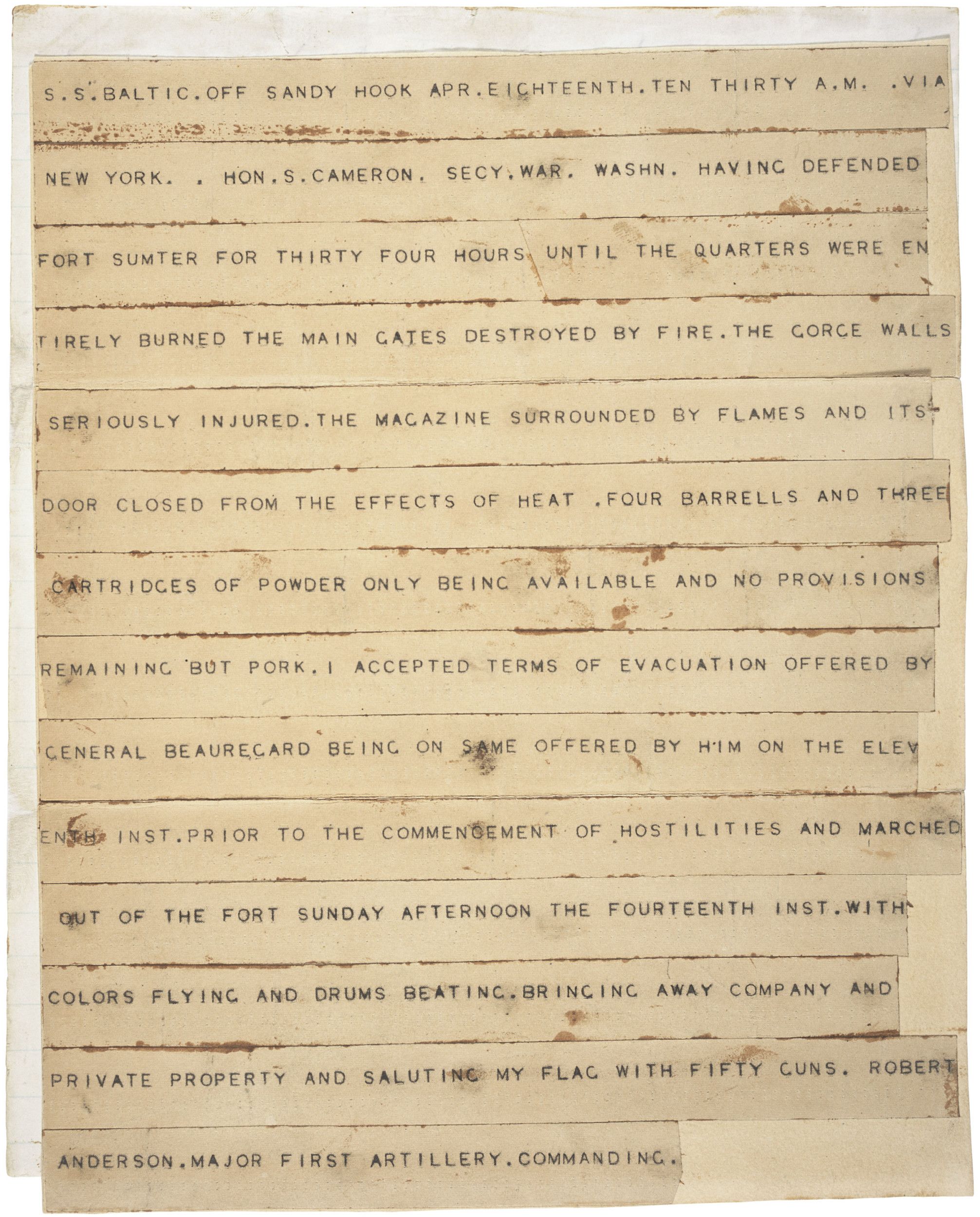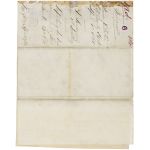Telegram from Major Robert Anderson to the Secretary of War
4/18/1861
Add to Favorites:
Add all page(s) of this document to activity:

Add only page 1 to activity:
Add only page 2 to activity:
This telegram notified Secretary of War Simon Cameron of the outcome of the battle that began the Civil War in earnest.
When Abraham Lincoln took office, the nation was breaking apart. South Carolina, Mississippi, Florida, Alabama, Georgia, Louisiana, and Texas had already seceded. In his inaugural address on March 4, 1861, President Abraham Lincoln asserted that secession was unconstitutional, that the Union of the states was perpetual, and states could not leave it at will.
As the first states seceded, they seized most forts, arsenals, and federal property inside their borders. On April 10, 1861, Brigadier General Pierre G.T. Beauregard, in command of the provisional Confederate forces at Charleston, South Carolina, demanded the surrender of the U.S. garrison of Fort Sumter in Charleston Harbor. Garrison commander Major Robert Anderson refused.
On April 12, the Confederate batteries opened fire on the fort, which was unable to reply effectively. At 2:30 p.m., April 13, Major Anderson surrendered Fort Sumter, evacuating the garrison on the following day. The battle had started at 4:30 a.m. and ended 34 hours later.
Major Anderson notified Secretary of War Simon Cameron of the outcome of the battle by telegram five days after he surrendered to Confederate Brigadier General Pierre G.T. Beauregard, as seen in this document.
The bombardment of Fort Sumter was the opening engagement of the American Civil War. From 1863 to 1865, the Confederates at Fort Sumter withstood a 22-month siege by Union forces. During this time, most of the fort was reduced to brick rubble.
When Abraham Lincoln took office, the nation was breaking apart. South Carolina, Mississippi, Florida, Alabama, Georgia, Louisiana, and Texas had already seceded. In his inaugural address on March 4, 1861, President Abraham Lincoln asserted that secession was unconstitutional, that the Union of the states was perpetual, and states could not leave it at will.
As the first states seceded, they seized most forts, arsenals, and federal property inside their borders. On April 10, 1861, Brigadier General Pierre G.T. Beauregard, in command of the provisional Confederate forces at Charleston, South Carolina, demanded the surrender of the U.S. garrison of Fort Sumter in Charleston Harbor. Garrison commander Major Robert Anderson refused.
On April 12, the Confederate batteries opened fire on the fort, which was unable to reply effectively. At 2:30 p.m., April 13, Major Anderson surrendered Fort Sumter, evacuating the garrison on the following day. The battle had started at 4:30 a.m. and ended 34 hours later.
Major Anderson notified Secretary of War Simon Cameron of the outcome of the battle by telegram five days after he surrendered to Confederate Brigadier General Pierre G.T. Beauregard, as seen in this document.
The bombardment of Fort Sumter was the opening engagement of the American Civil War. From 1863 to 1865, the Confederates at Fort Sumter withstood a 22-month siege by Union forces. During this time, most of the fort was reduced to brick rubble.
Transcript
S.S. Baltic. off Sandy Hook apr. Eighteenth Ten Thirty A.M. via New York. Hon. S. Cameron. Secy. War Washn. Having defended Fort Sumter for thirty four hours until the quarters were entirely burned the main gates destroyed by fire. The gorge walls seriously injured. The magazine surrounded by flames and its doors closed from the effects of heat. Four barrells and three cartridges of powder only being available and no provisions remaining but pork. I accepted terms of evacuation offered by General Beauregard being on same offered by him on the eleventh inst. Prior to the commencement of hostilities and marched out of the fort Sunday afternoon the fourteenth inst. With colors flying and drums beating. Bringing away company and private property and saluting my flag with fifty guns. Robert Anderson. Major First Artillery. Commanding.This primary source comes from the Records of the Adjutant General's Office.
National Archives Identifier: 594525
Full Citation: Telegram from Major Robert Anderson to the Secretary of War; 4/18/1861; Union Battle Reports, 1874 - 1899; Records of the Adjutant General's Office, Record Group 94; National Archives Building, Washington, DC. [Online Version, https://www.docsteach.org/documents/document/telegram-major-anderson-secretary-war, April 24, 2024]Activities that use this document
- What Else Was Happening During the Civil War Era?
Created by the National Archives Education Team
Rights: Public Domain, Free of Known Copyright Restrictions. Learn more on our privacy and legal page.





